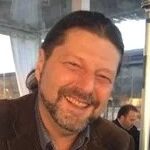- Face to face
- 28 de April de 2025
- No Comment
- 6 minutes read
Montserrat Tura: “Girls had no access to secondary education”

FACE TO FACE WITH
Montserrat Tura
Montserrat Tura: “Girls had no access to secondary education”

Montserrat Tura Camafreita was born in Mollet del Vallès in 1954, and has led a multifaceted life, combining her medical profession, her literary vocation, and her social engagement as a political figure. She has published several books, including El valor estratègic del temps (2010), Estirant el fil (2014), La catifa vermella (2016), and República pagesa, which was awarded the Carles Rahola Prize for Essay in 2017. She has been highly active in social movements, most notably in defending the natural spaces of the Besòs river basin. Her personal trajectory broadens this already rich profile: she served as mayor of her hometown for sixteen years, was a member of the Parliament of Catalonia, and held office as Minister of the Interior and later as Minister of Justice in the Catalan Government between 2003 and 2010.
Her scientific background is equally significant: she is a specialist in internal medicine, having worked at the Hospital Clínic in Barcelona and at the Hospital of Palamós, where she also served as director and to which she returned after her years in institutional office.
One of the reasons for our conversation is that we are both full members of the Acadèmia de Ciències Veterinàries of Catalonia. I believe it is well worth immersing ourselves in this Face to Face with Montserrat Tura.
Do you miss your political past?
I do not miss it. I have integrated it; it forms part of who I am. I would not be the person I am today without the responsibilities I have assumed. I always try to explain that I will always be a political woman. I cannot conceive of the world without a political lens, without analysis grounded in politics.
Could you describe in three adjectives what it meant to be a woman in politics?
Conviction, tenacity, hope (indestructible).
“I would not be the person I am today without the responsibilities I have assumed”
Could you tell us more about your latest professional project?
For the past few months, I have done very little clinical work, and I do miss the patients. I now work as an analyst for an international organisation.
What does the word “effort” bring to mind?
Einstein’s phrase: work on what you love, and you will never feel the weight of a working day.
Do you see a connection between your professional projects and your educational background?
Yes. I had to pave many ways in order to study medicine. We tend to forget that, in the vast majority of Catalonia, girls had no access to secondary education.
What did university mean for your personal life?
A dream come true. A vast body of knowledge at my disposal.
And for your professional life?
I studied medicine and practised it to the fullest. And when, through my institutional responsibilities, I improved the living conditions of the population, I was also, in a way, practising medicine.
With regard to the current educational system, where do you think improvements are needed?
I am not an expert, but I have read extensively on the subject, and I appreciate educational systems that aim to develop each pupil according to their circumstances and their talents.
“I appreciate educational systems that aim to develop each pupil”
How do you understand the concept of authority?
As someone who becomes a reference point because they are recognised as such by the community.
Thinking back on your own education, what stands out as the most positive aspect?
Every stage evokes pleasant memories, many of which have been softened by the passage of time. Nonetheless, some episodes remain painful, marked by pain, obstacles, added difficulties, and a draining of energy.
From a utopian perspective, what would be your wish for the community in which you live?
A revival of hope—a return to a period characterised by expanding wellbeing and a profound sense of security, understood in the broadest sense of the word.
Source: educational EVIDENCE
Rights: Creative Commons


